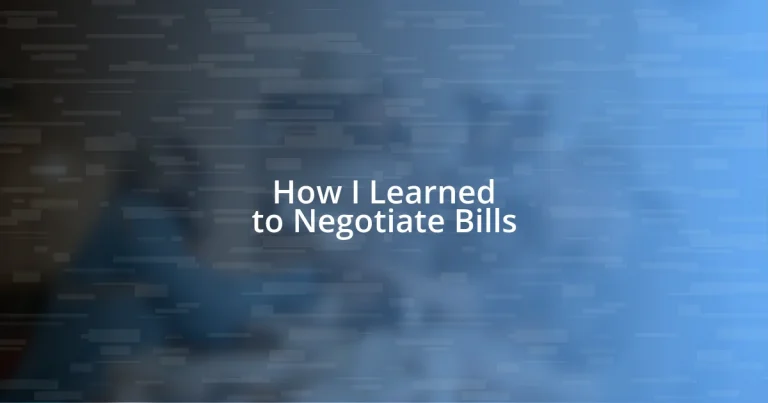Key takeaways:
- Negotiating bills can lead to significant savings and fosters a sense of empowerment and self-advocacy.
- Researching options, understanding the details of your bills, and utilizing community knowledge enhances negotiation effectiveness.
- Effective communication, patience in addressing objections, and diligent follow-up are crucial for successful negotiations.
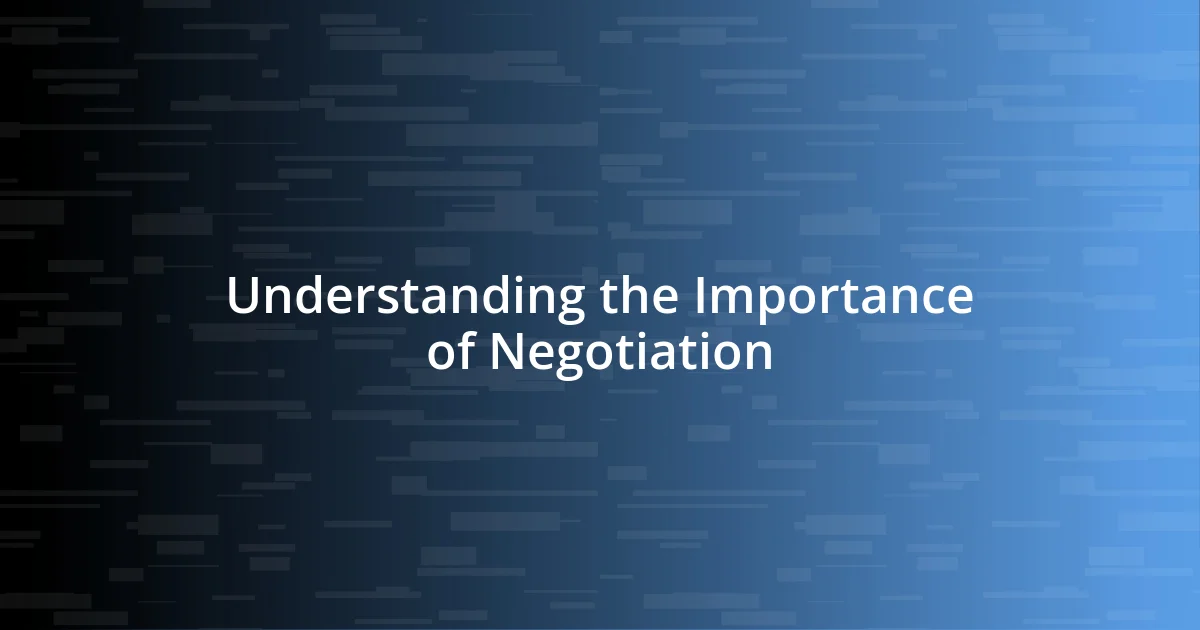
Understanding the Importance of Negotiation
Negotiation isn’t just a skill; it’s a crucial life tool that can significantly impact your finances and overall well-being. I remember feeling anxious and overwhelmed when faced with high bills that seemed non-negotiable. However, I realized that even small adjustments could lead to meaningful savings, which sparked my interest in mastering this skill.
Think about it: how many times have you accepted a bill without questioning it? I used to do that all the time, but once I started negotiating, I found a sense of empowerment. Each successful conversation taught me that it’s not just about saving money; it’s about advocating for myself and acknowledging my value as a customer. It energizes me to consider anyone else in that position feeling helpless—what if they knew they had a voice too?
Through negotiation, I discovered the importance of being proactive rather than reactive. When I reached out to providers, I opened the door to discussions that were often more fruitful than I anticipated. It’s fascinating how simply asking can change the dynamics of the situation. Have you ever felt that rush of excitement after successfully negotiating? It’s addictive and truly transformative!
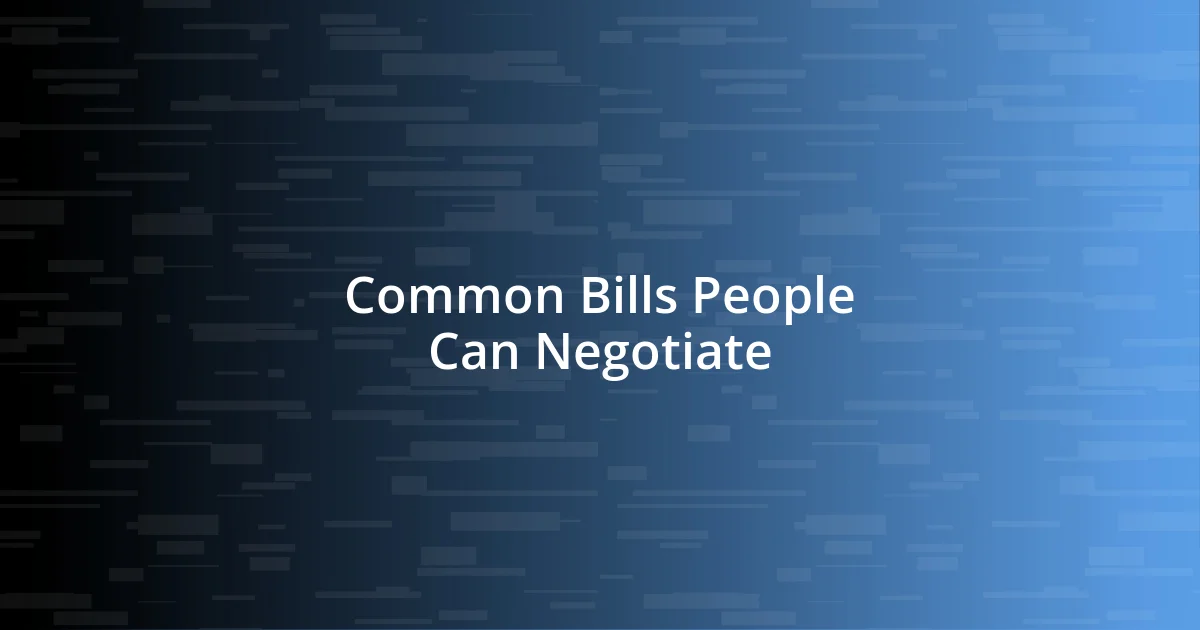
Common Bills People Can Negotiate
When it comes to negotiating bills, many people are surprised to learn just how many can be adjusted. I once believed my monthly payments were set in stone, but I’ve since discovered several categories where negotiation can yield significant savings. It’s all about having the confidence to ask and being open to a conversation.
Here are some common bills that people often negotiate:
- Cable and Internet: I negotiated my cable package down by mentioning competitor prices, and it felt great to see the rate drop right before my eyes.
- Medical Bills: After receiving an unexpected medical bill, I called to discuss my options and secured a payment plan that was way more affordable.
- Insurance Premiums: I’ve learned that simply stating I may shop around can prompt my insurance provider to offer me a better rate, which has happened more than once.
- Credit Card Interest Rates: When I called to discuss my interest rate, I was pleasantly surprised when they matched an offer I had from another bank.
- Utilities: I reached out to my electricity provider while researching energy-saving options, and they offered me a rebate that I didn’t even know was available.
These experiences were eye-opening. Each successful negotiation built my confidence and reinforced the idea that advocating for myself is vital—if I don’t speak up, who will?
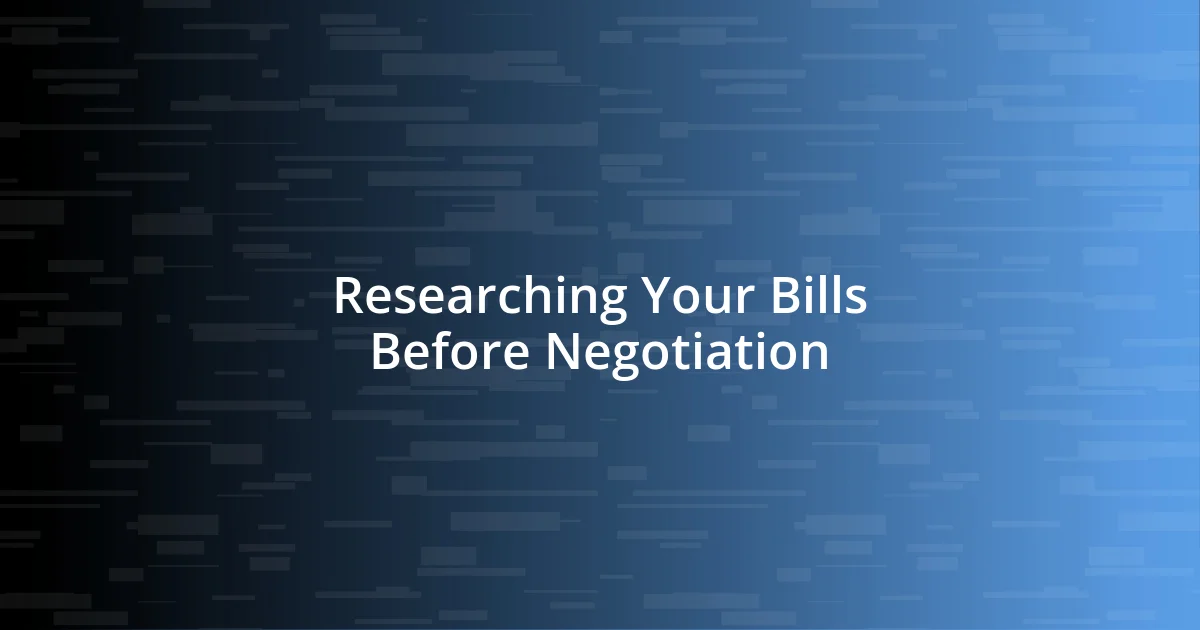
Researching Your Bills Before Negotiation
Researching your bills before entering a negotiation is one of the most crucial steps you can take. I learned the hard way that not knowing your options is a missed opportunity. For instance, when I first started, I looked up my cable company’s competitors and discovered they were offering much lower rates. Armed with this information, I felt confident and empowered during my call, which ultimately led to a better deal. Isn’t it incredible how data can shift the balance of power in a conversation?
The importance of understanding specific terms and conditions of your bills cannot be overstated. I once figured out that my internet provider had a hidden fee buried in the fine print! It was frustrating to realize I had been paying more than I needed to. By digging through my bills, I gained insights that not only helped in negotiations but also highlighted areas where I could cut costs. Have you ever noticed something unexpected on your bill? That little detail can be a game changer.
Lastly, I recommend checking out online forums and customer reviews for tips about negotiating particular bills. This resource proved invaluable for me. I stumbled upon articles where others shared successful scripts and strategies; implementing even one of their suggested techniques made a huge difference for me in my negotiations. Gathering this kind of information creates a safety net; knowing that others have navigated similar conversations gives you the courage to step up and advocate for yourself.
| Aspect | Details |
|---|---|
| Research Method | Look for competitor rates and terms |
| Importance of Understanding Bills | Identifying hidden fees and terms |
| Community Input | Utilizing online forums and reviews |
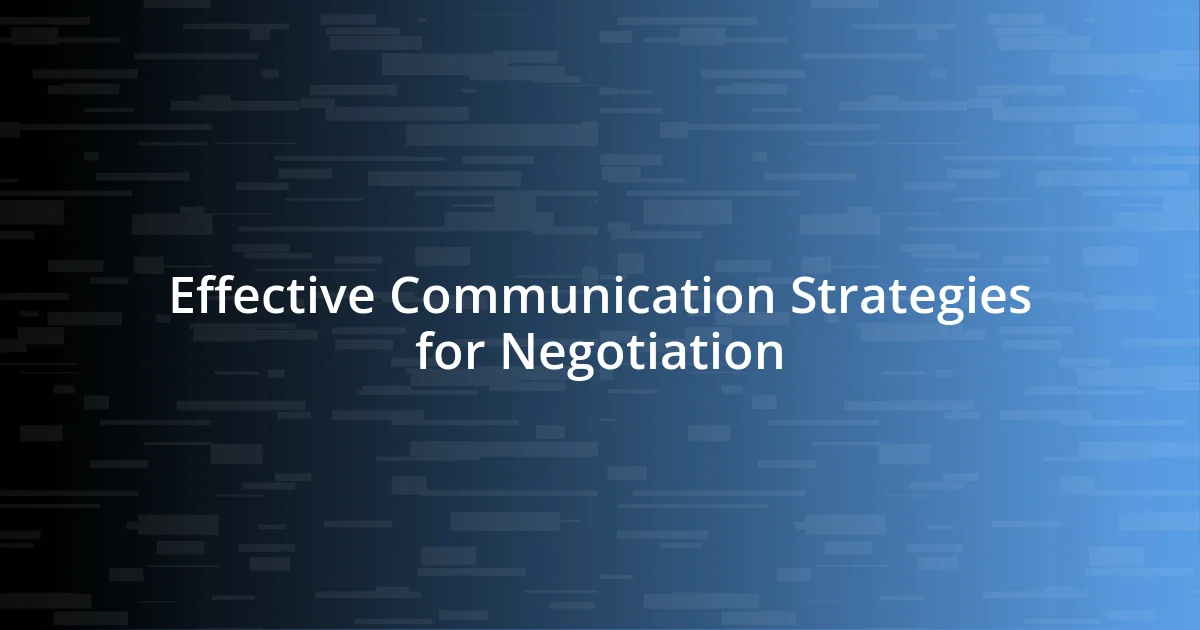
Effective Communication Strategies for Negotiation
Effective communication is crucial in negotiation, and I’ve found that active listening plays a pivotal role. When I approach a bill negotiation, I focus on not just what I want to say but also on truly understanding the other person’s perspective. For example, during my call with the internet provider, I made sure to listen for cues about their policies, which helped me frame my arguments more effectively. Do you ever feel like you’re only half-listening during these conversations? I urge you to tune in fully—it can make all the difference.
Clarity in my communication has always been a priority. I remember one instance where I stumbled over technical jargon while discussing my medical bills. By simplifying my language and being direct about what I wanted, I found the representative was more willing to assist. Have you ever noticed that cutting through complexity can create a more amicable atmosphere? It’s not just about negotiation; it’s about human connection.
Finally, I emphasize the importance of maintaining a respectful tone. During one negotiation, I was surprised by how a polite approach garnered a positive response—even when asking for something considerable. I found that a simple “thank you for your help” can turn an ordinary negotiation into a more collaborative dialogue. Trust me, the results are typically better when both parties feel valued and respected. What’s your experience with keeping the conversation friendly? I can say, it works wonders.
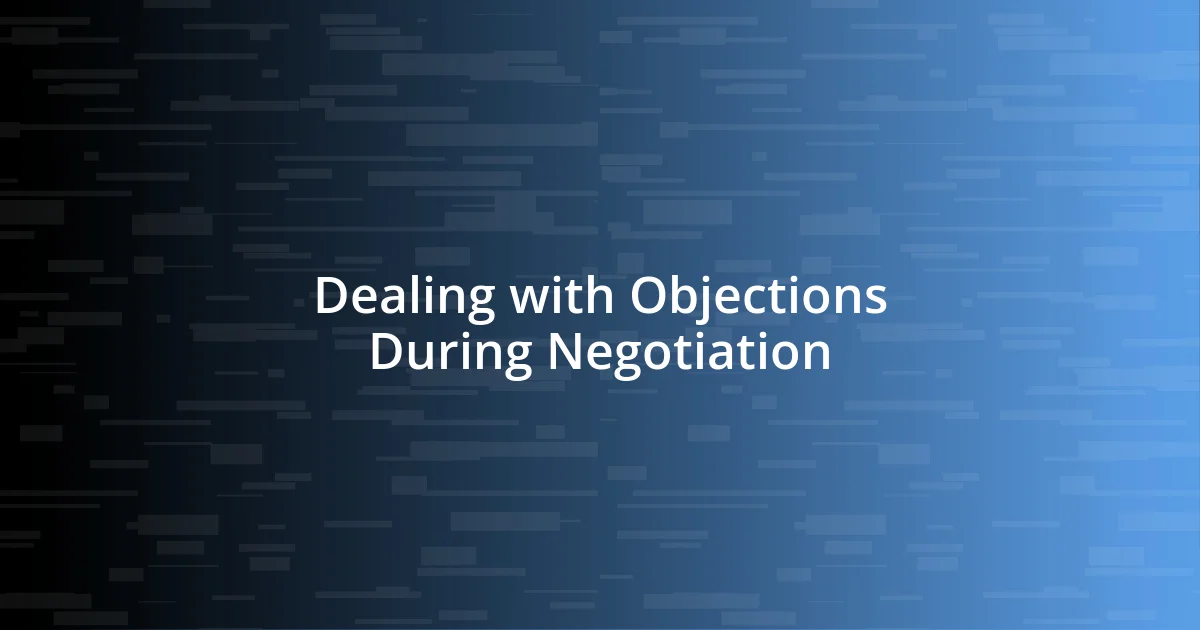
Dealing with Objections During Negotiation
When I first encountered an objection during a negotiation, I was completely taken aback. The customer service representative cited company policy, making it sound like my request was impossible. At that moment, I realized that objections are not roadblocks; rather, they can be opportunities. Instead of retracting my request, I took a deep breath and asked, “What would it take for you to consider this?” This simple question not only opened the door for further dialogue but also showed I was genuinely interested in finding a mutual solution.
Another time, while negotiating a higher discount on my phone bill, I faced a reluctant agent who insisted that the offered rate was the best they could do. Rather than feeling discouraged, I referenced a recent promotion I found online. I calmly explained why I thought I deserved a better deal and urged them to reconsider my case. This approach transformed the negotiation into a collaborative effort, demonstrating that I was informed and ready to engage. Have you ever found that the best outcomes occur when you shift the perspective from opposition to collaboration?
I also learned the value of patience in dealing with objections. There was a particular instance where I asked for an additional waiver on my bill, and the representative responded with hesitation. Instead of rushing to accept the initial answer, I maintained a composed demeanor. After a few moments of silence, I offered an alternative suggestion, and to my delight, they agreed to escalate my request for further approval. It’s fascinating how remaining calm can often sway the outcome in your favor. Have you ever felt that taking a moment to breathe can lead to unexpected results? In my experience, a little patience goes a long way in negotiations.
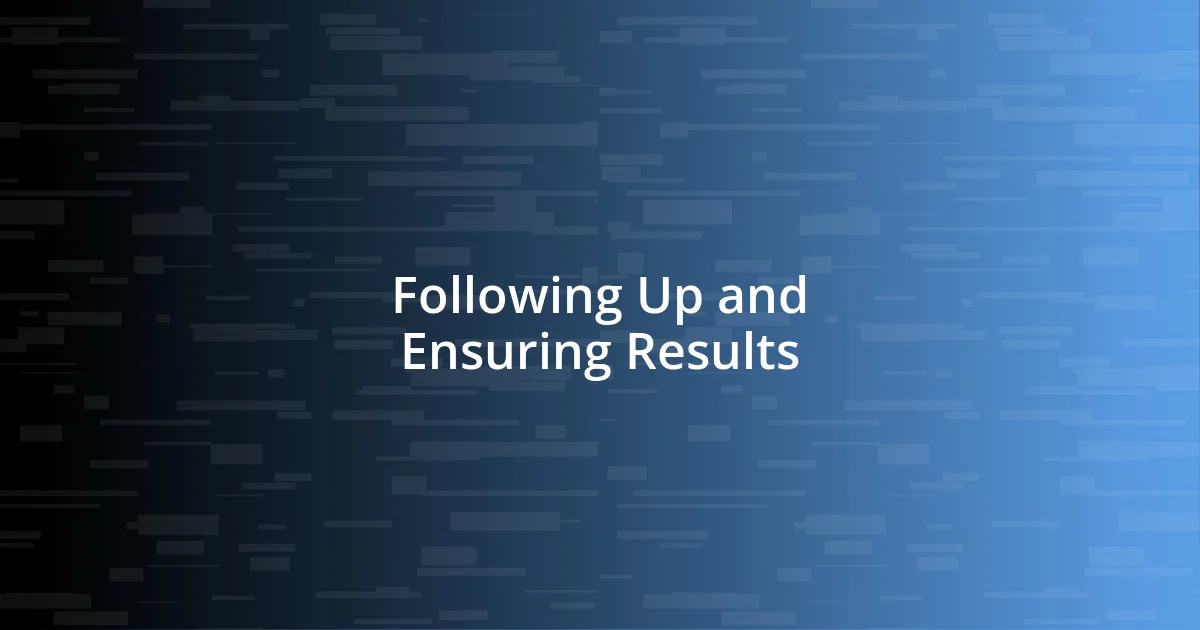
Following Up and Ensuring Results
Following up after a negotiation is essential. I remember a time when I secured a lower rate on my cable bill, but I didn’t stop there. A few days later, I called back to confirm that the adjustment was applied and also to clarify the new terms. It’s easy to assume everything is set, but what if it’s not? Ensuring results means showing that you are actively engaged in the process.
I’ve also learned to document my interactions. After negotiating a reduction, I took notes on the details—including who I spoke to and what was promised. When I faced a problem a month later, having that information at my fingertips made it so much easier to address the issue. Can you imagine how empowered I felt being able to reference our earlier conversation? It reminded me that staying organized can pay off significantly in these situations.
Finally, patience is key even after you think you’ve reached a resolution. There was an instance when my utility bill still reflected the old charges weeks later. Instead of getting frustrated, I approached the follow-up as an opportunity for dialogue. I gently reminded the representative of our previous agreement. This approach not only reaffirmed my commitment but also allowed me to express my concerns. Have you ever found that a thoughtful follow-up can yield unexpected results? In my experience, it often opens new avenues for negotiation.












